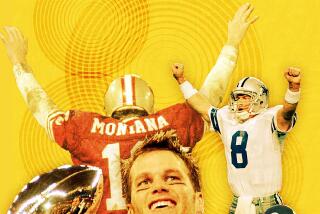History Is Not on Seattle’s Side
- Share via
SEATTLE — Shaun Alexander barely had finished putting down his pen after signing a new $62 million Seahawks contract when he set some high expectations.
“It is going to be exciting to see us come out next year and prepare our trip to Miami,” the league MVP said earlier this month, referring to the site of next season’s Super Bowl.
Seahawk President Tim Ruskell, seated next to Alexander, added to the optimism.
“We have a good football team. This team went to the Super Bowl and we are on a run right now,” Ruskell said. “We are excited about what the future holds -- and a big part of it is this guy sitting to my right.”
Finally, Seahawk chief executive officer Tod Leiweke spoke of the team’s hopes of immediately returning to the Super Bowl after taking 29 years to get there.
“When Shaun talked about going to Miami and doing it all over again, that excited a lot of us,” Leiweke said, “not just our fans, but everybody from Paul Allen down.”
From team owner Allen to groundskeepers to coffee brewers in every nook of town, Alexander’s return spawned the belief the Seahawks should be sunning on South Beach next February.
But history is not on their side.
The last five teams to lose the Super Bowl have not even qualified for the playoffs the following season. In fact, the Tennessee Titans of 2000 are the only Super Bowl runner-up in the last seven years to manage a .500 record in their hangover year.
Seattle’s optimism got another boost with Wednesday’s agreement to bring back sack leader Rocky Bernard. That left the re-signing of Steve Hutchinson, a two-time All-Pro left guard, as the last major piece to the Seahawks’ puzzle.
That will be Seattle’s toughest task. Hutchinson, the team’s transition player, signed a $49 million, seven-year offer sheet with Minnesota last Sunday. The Vikings contract would guarantee Hutchinson $16 million, which the Seahawks could afford.
But the offer also includes a provision that if Hutchinson is not the team’s highest-paid offensive lineman at any time during the contract, the entire contract becomes guaranteed after the first season.
The Seahawks’ seven-day window to answer the Minnesota offer was supposed to end Sunday. But now there will be an arbitration process beginning on Saturday to hear a complaint the league filed on the Seahawks’ behalf that the guarantee clause violates the NFL’s labor agreement. A decision is not expected until Monday, at the earliest.
Ruskell has said Alexander’s signing was “the beginning of getting our free agents back in the fold.”
“That is what we are going to do,” Ruskell said. “Maybe we won’t get them all, but we want to keep our core together.”
Free-agent defections such as Hutchinson’s potential goodbye, and the general NFL parity they have created, have contributed to Super Bowl teams quickly becoming also-rans. So have opponents who spend all off-season studying how Super Bowl teams got there and then finding effective ways to counter them the following season.
But the primary reason has been something not even Allen’s Microsoft billions can prevent: injuries.
The Philadelphia Eagles, the 2004 Super Bowl losers, ended 2005 at 6-10. Quarterback Donovan McNabb had a sports hernia. Dynamic running back Brian Westbrook and cornerback Lito Sheppard also got hurt. Plus, there was the distraction and ultimate suspension of receiver Terrell Owens.
The Carolina Panthers didn’t lose any key free agents after a narrow Super Bowl loss to New England. That made them a favorite to return to the big game in the 2004 season. But leading receiver Steve Smith broke his leg in Week 1. Premier runner Stephen Davis injured his knee in Week 2. Defensive tackle Kris Jenkins missed the season with a shoulder injury. The Panthers had a league-high 14 players on the injured reserve list and started 1-7 en route to 7-9.
The 2003 Oakland Raiders lost reigning league MVP Rich Gannon and backup quarterback Marques Tuiasosopo to season-ending injuries.
The Raiders used five quarterbacks by the season’s miserable end and finished 4-12, the biggest post-Super Bowl pratfall.
More to Read
Go beyond the scoreboard
Get the latest on L.A.'s teams in the daily Sports Report newsletter.
You may occasionally receive promotional content from the Los Angeles Times.










